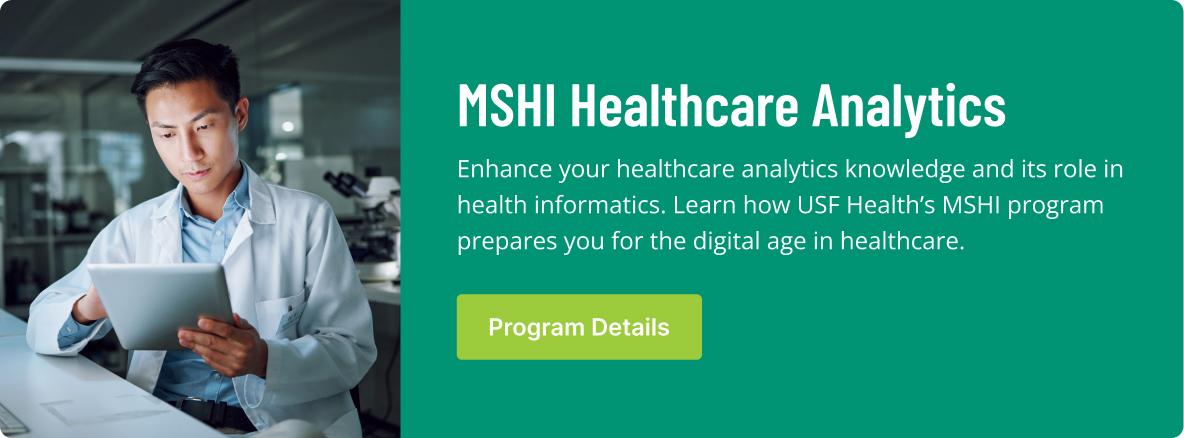Innovations in healthcare analytics have led to creation of technological tools that can benefit physicians, nurses and other clinicians by driving better diagnostic decisions and reducing routine paperwork.
However, to put tools such as data analytics, machine learning and artificial intelligence (AI) to work, clinicians need training not only in how to use them but understanding how those technologies are fueled by data.
Recent studies show this is not happening in many healthcare operations. Despite unprecedented levels of investment in analytics, most healthcare companies have not made the same investment in training.
Programs such as the Graduate Certificate in Healthcare Analytics from the University of South Florida are designed to fill this gap between the availability of digital systems and the knowledge needed to put them to use.
The Troublesome Relationship Clinicians Have with Analytics
In the Future Health Index 2020 report by Philips, 78% of younger healthcare workers expressed a willingness to embrace new technology. However, 35% find themselves overwhelmed by digital patient data and don’t know how to use data to inform patient care. For the report, Phillips interviewed 3,000 healthcare workers in 15 countries, all under the age of 40.
This younger generation of healthcare workers cited three areas where improvements are needed: interoperability between healthcare computer systems, improved accuracy of data and improved data security.
They also don’t fear the change toward more automation and data-driven decision making. Only 13% said future job security could be in jeopardy, while 46% said automation could improve accuracy in administrative work and 44% voiced excitement over the possible use of artificial intelligence in diagnosing patients.
The Cost of This Issue
Despite high interest in the use of technology in healthcare, most healthcare companies remain behind in integrating data-driven systems into their operations. In a survey by Black Book of 748 provider organizations, as reported in Healthcare IT News, 80% of respondents reported that the use of advanced analytics in their operation is “negligible.”
In that same report, 84% of executives said their companies only use analytics in a “limited or minimal” way, primarily to “generate commercial or outcome insights.”
The survey found this issue is especially prevalent at hospitals that underperform financially. The cost-savings that a data-driven strategy can provide have been lost at these operations. The reasons for not using more data analytics include a lack of training and clinicians reporting they do not have the time to learn new systems.
That said, 93% of companies plan to invest more in data analytics in the coming year. And they also are searching to improve their healthcare analytics staff.
The Need for Training
As the studies show, the opportunities for using analytics, artificial intelligence and machine learning remain an untapped resource at most healthcare operations.
In addition to the potential for streamlining administrative work, technology can also flag high-risk patients who need preventative healthcare treatment, decrease wait times for patients by better organizing patient intake and transfer systems, and provide algorithms that do deep scans of images, searching for signs of medical issues such as cancer or even a virus such as COVID-19.
While physicians may feel learning about healthcare analytics is not part of medical school, training on such systems can give them added support in making diagnostic decisions. Automated systems also can significantly reduce their time spent on paperwork. Data-driven systems also allow physicians to spend less time analyzing data and more on interpreting results and providing compassionate care.
Where Physicians Can Start with Training
The complexities of digital systems require healthcare professionals to take training that helps them to trust AI systems and understand how to use data to reach the best possible conclusions on administrative and clinical decisions.
That said, they also must learn to retain a healthy skepticism of and understanding of the ethical issues of AI in healthcare, according to Health IT Analytics, because of issues such as unscalable oversight – a system that requires too much data and time to operate properly. There is also the issue of “black box” AI, which describes a situation where a clinician does not know all the variables that went into an automated system producing an output.
Given these complex challenges, healthcare professionals need to better understand how AI systems gather and interpret data. A graduate certificate in healthcare analytics can provide knowledge and context around data-driven systems. The program offered through USF also has the advantage of being 100% online, allowing healthcare professionals to schedule class time around demanding professional schedules. Those who find they have a passion for analytics, can also seamlessly transition into a Master of Science in Health Informatics with a concentration in Healthcare Analytics.




